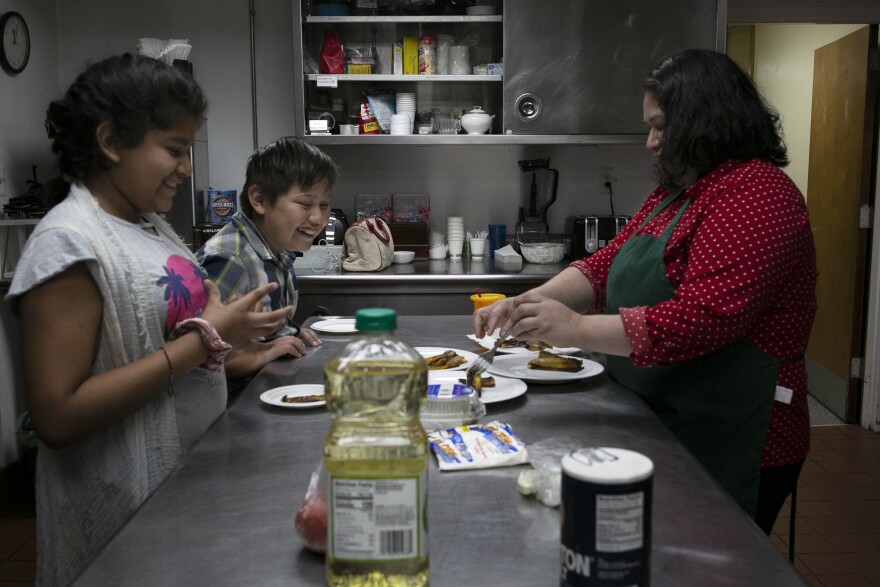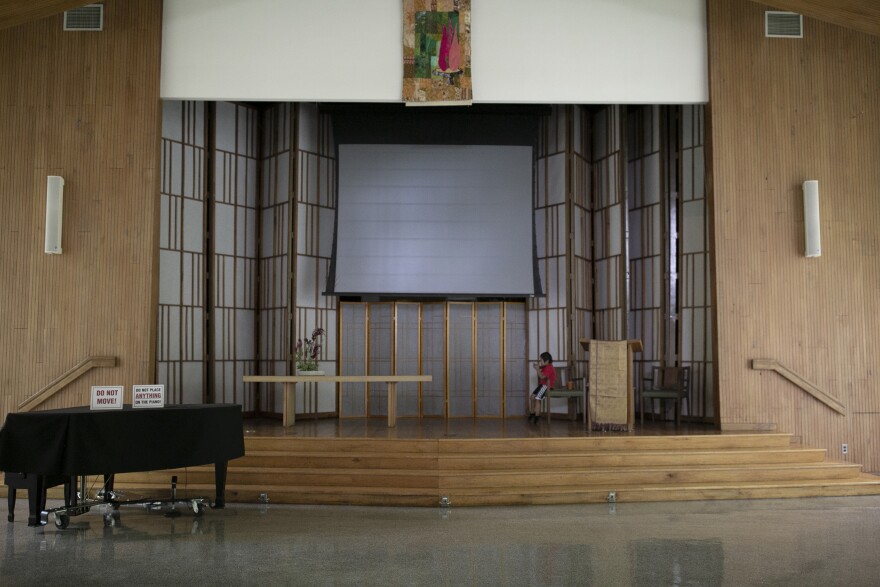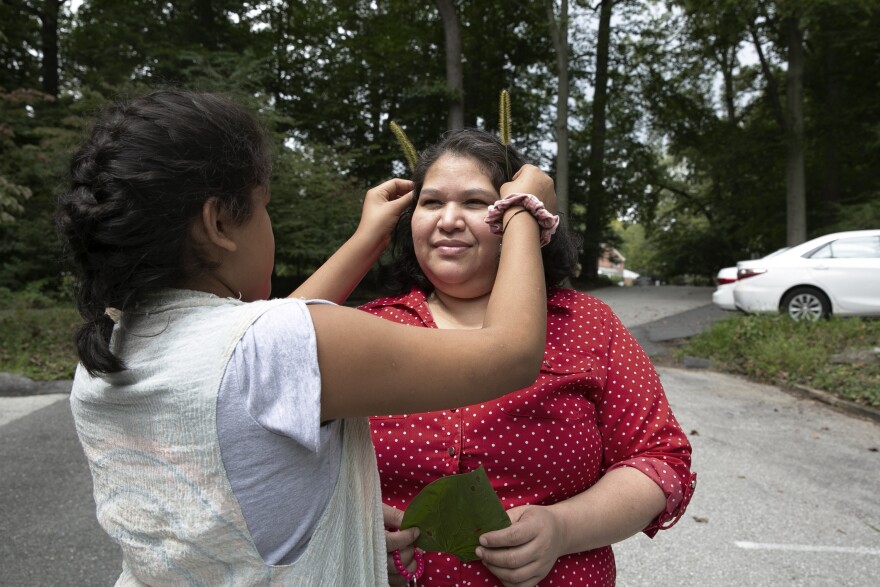For nine months, Rosa Gutierrez Lopez has been living at Cedar Lane Unitarian Universalist Church in Bethesda, Md. She can't leave the property. If she does, she risks being deported to El Salvador.
Like millions of immigrants in the United States, Gutierrez Lopez is undocumented. She's lived in the U.S. for about 14 years, since she fled violence in El Salvador. She has three U.S.-born children and had a life in Fredericksburg, Va. She was granted deferred action in 2014, which gave her a reprieve from deportation, but when she went to renew her status in 2017, it was refused. Immigration and Customs Enforcement slapped an ankle monitoring bracelet on her and she was given a deadline — leave by Dec. 10, 2018. She didn't know what to do until the church opened its doors and promised her sanctuary.
It's one of a growing number of places of worship offering to protect undocumented people from deportation in the intensifying crackdown under the Trump administration.


When we first met Gutierrez Lopezin January she was timid and fragile. She wept about being separated from her children — they were staying in Virginia where they went to school instead of joining her at the church. She also wept when she looked at the bracelet on her ankle, visible beneath her black tights.
"It makes me feel like a criminal," she said through an interpreter.
Her lawyer was trying to get her asylum case reopened. When she crossed the border into Texas she'd declared herself to border agents. But she didn't understand the slip of paper with the court date. Gutierrez Lopez couldn't read English. She said she got confused. She never showed up and a removal order was issued.
It's been eight months since we spoke for the first time and she's still on the multi-acre site of the Cedar Lane church. There's no timeline for when she might be able to leave.
But on this sun-filled summer day, Gutierrez Lopez, who was a cook in an Italian restaurant, has settled into a routine of sorts at the church she now calls home, her mood matching the weather.
"I'm very busy," she said. "I have English classes. I'm going to start yoga classes. Meditation. And I volunteer twice a month cutting vegetables here in the church."

She loves food prep, it reminds her of working, when she could still work. And the food goes to soup kitchens and food pantries.
"Yoga is hard," she said. "But I like it."
She's brighter and chattier, she seems to barely notice the monitoring bracelet on her leg. And she's no longer separated from her children Maria, 12, Juan Pablo, 9 and her youngest, John. He is just 7 and because of his down syndrome has special needs.
"They're here with me. They're going to stay here now," she said.
The church congregation helped get the three kids — who were attending three different Virginia schools — transferred into Maryland's Montgomery County School District. School officials came to the church to work with Gutierrez Lopez, especially on an education plan for John.
As we speak, her children are out with members of the church buying clothes for the first week of school. Because Gutierrez Lopez can't do back to school shopping with them.

"At first it felt weird, but sometimes when they're at the store they video call me and say, 'I'm going to get this, I'm going to get this!' " she said.
This week they'll start school. John will be picked up at the church but her eldest two have to go to a bus stop outside the confines of the property.
"It's difficult because I can't take them to see where the bus picks them up," she said.
A volunteer from the church will do that for her. For nine months church volunteers have been Gutierrez Lopez's conduits to the outside world, her protectors and the protectors of her children, her stand-in for all the things a parent has to do away from home. Someone is always with her in case she needs them. During our interview, a companion sits quietly in the corner.
"We have people putting in four-hour shifts or more during the day," said Rev. Abhi Janamanchi, the senior minister at Cedar Lane. "At night, we have companions for the children. Then we have people who take the children out to activities or outings like shopping for school. We have people engaged in going to buy groceries. Then we have people who make food. And this is every day. It's not like you do it once and then you're done."
It's a commitment they understood when the congregation discussed becoming part of a movement of sanctuary churches, he said. But it takes its toll on volunteers.

"Some of them have been doing it continually since December," he said. "Others have done it for a couple of months, taken a break and come back, and then we have other new people who step in. So that's an investment of one's life energy. It is a wonderful gift. It also takes something out of people."
It is the first time the church has provided physical sanctuary to someone in danger of being deported. It was a decision they made as a congregation. They joined a regional network of churches offering sanctuary. Then Gutierrez Lopez needed help. Almost 300 volunteers from the network are helping her and others. And Cedar Lane church will provide sanctuary for as long as it is needed, Janamanchi said.
"We recognized that this would be asking more of ourselves in ways that we had not, but that's part of what I see to be the spiritual practice and discipline of sanctuary," Janamanchi said. "It is sharing the comfort we find in our spiritual home with others. Especially those who are being threatened and don't have that privilege and comfort at this time in their lives. And to me, that undergirds the work of sanctuary in terms of what it means to practice radical hospitality."
Since our last meeting, the church has tried three times to apply to get her removal order deferred.
"Every time we have tried to submit her application, ICE has refused to accept it insisting that Rosa should submit that in person," Janamanchi said.
She hasn't done that, because the church believes she would get detained and deported if she left the grounds. They saw it happen in North Carolina last year.
"A man who was in sanctuary at a church was misled to come to an ICE office thinking that it was going to be a routine appointment where he would be offered the deferral," Janamanchi said. "Instead, he was immediately arrested and there was actually a witness by the church members who were there for hours trying to prevent ICE from doing it. But in the end he was detained and then deported to Mexico."

Church supporters went to jail trying to protect him.
ICE did not respond to an email request for comment on the status of Gutierrez Lopez's case. The agency has said in the past that it maintains a policy against detaining or arresting people in "sensitive locations," such as hospitals, schools or churches.
Since Gutierrez Lopez sought sanctuary at this Maryland church, her lawyer, Jasmin Tohidi, said a judge in Harlingen, Texas denied the request to reopen the asylum case. Her lawyer appealed that decision with the Board of Immigration Appeals and followed up with another motion after Gutierrez Lopez's brother and his family were granted asylum. They faced the same threat of violence, the lawyer argues. Meanwhile, the Trump administration has appointed six new judges to that board whose approval rate in asylum cases is well below the national average. Two are judges who attorneys and advocates have accused of being unfair and a third has a history of denying asylum to victims of domestic violence.
Until the board makes its decision, there's nothing Gutierrez Lopez can do but wait.
She goes on walks — a doctor prescribed the walks for her health. But when she nears the exit of the parking lot she stops.
"I can walk until the edge of the property but I don't want to risk it," she said. "A car could pass and grab me."
Only half joking, she laughs, and turns around.
This month, she'll give a sermon at a special bilingual service. She's preparing now.

"I'll bless our countries, because there is so much violence. I'll also thank God for life and for keeping our kids well," she said. "I'll also pray to God that Donald Trump opens his heart a little and that he has a little compassion and love and that he liberates all the kids in detention centers."
Gutierrez Lopez has more prayers. She'll pray for the nearly 700 people — mainly Latino immigrants — in Mississippi who were arrested during coordinated ICE raids in August. And for those who are "unjustly detained" in other countries.
"It's not just here that there is the controversy of racism and family separation. It's global," she said. "Not all people who immigrate are bad."
Copyright 2023 NPR. To see more, visit https://www.npr.org.






